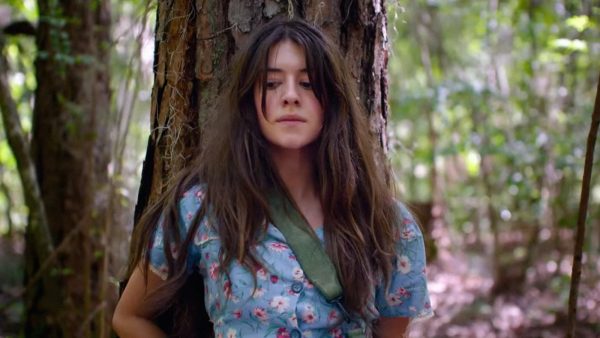Where the Crawdads Sing, 2022.
Directed by Olivia Newman.
Starring Daisy Edgar-Jones, Taylor John Smith, Harris Dickinson, Michael Hyatt, Sterling Macer Jr., David Strathairn, Garret Dillahunt, Eric Ladin, Ahna O’Reilly, Joe Chrest, Logan Macrae, Luke David Blumm, Charlie Talbert, Jojo Regina, Jayson Warner Smith, Billy Slaughter, Robert Larriviere, Caroline Cole, Bill Kelly, Blue Clarke, and Sarah Durn.
SYNOPSIS:
A woman who raised herself in the marshes of the deep South becomes a suspect in the murder of a man she was once involved with.
Anyone hooked, line and sinker, by the synopsis for Where the Crawdads Sing might want to reevaluate their expectations. That’s not because films should always come as advertised (many of them turn out to be better when details are hidden), but it’s safe to assume director Olivia Newman’s adaptation of the popular Delia Owens novel (a book I had that I have not read, but have no clue how anyone can find something of value in based on this version of the story) is primarily concerned with the murder of a man the protagonist had a romantic entanglement with and is now the prime suspect for in the case.
Instead, that turns out to be the framing device for a flashback-driven narrative chronicling the upbringing of our protagonist and two different relationships with two polar opposite personalities (ultimate nice guy that can do no wrong and ultimate pushy, stalking creep).
Daisy Edgar-Jones is Kya (played in childhood flashbacks by Jojo Regina), living alone in a North Carolina marsh. Growing up in the 1950s, Kya had a standard cliché verbally and physically abusive father (a performance so overplayed by Garret Dillahunt the viewers will desperately want the story to move on to something else or get back to the 1969 present-day murder mystery/courtroom hearing) who, one by one, drives away every member of the family including his wife.
Yes, Kya’s siblings all leave, eventually with her mother abandoning her in what comes across as unbelievably lazy screenwriting from Lucy Alibar) to get the young girl alone with this monster guardian for more misery. Perhaps it’s more fleshed out in the novel, but here, it’s as if the filmmaking team is annoyed they must bother with this section, cutting corners everywhere they can and presenting characters one-dimensionally.
Roughly 5 minutes later, tragedy strikes again, and Kya is living by her lonesome in the marsh. The townspeople have always been judgmental toward the family. Bullies ensured she only attended elementary school for one day. However, Kya is in touch with the elements (and it should be noted that the murky scenery is one of the only bright spots here) and knows how to fish and capture fresh mussels for the owners of a nearby general store (played by Sterling Macer Jr. and Michael Hyatt) for some money and boat gas.
This hospitable couple turns out to be some of the only kind people in her life, and she quickly realizes that she is living all alone, yet shockingly does nothing about it. The only time to discuss possibly putting Kya in a group home comes when she is an adult. Folks, the parenting and guardianship here are off-the-charts terrible.
Once it’s established how Kya cares for herself and makes a living from her teenage years, Where the Crawdads Sing jumps forward and then begins to focus on her connection to a local young man named Tate Walker (Taylor John Smith), he teaches her how to read and write all while genuinely falling in love with her, taken aback by her knowledge of birds and feathers in nature.
Not only is their chemistry somewhat wooden, but there’s also no tension because it is made clear that Tate is not the boyfriend who ended up dead. That character (played over-the-top by Harris Dickinson) doesn’t show up until around an hour of a mercilessly long 125 minutes.
There are so many laughable aspects to Where the Crawdads Sing, chief among them being there is not an authentic bone here. The tumultuous family drama is completely glossed over, the relationships boil down to nice guy/cruel guy while dedicating way too much time trading empowering independence for a story about seeking love and crying over heartbreak, and you would have to be brain-dead not to figure out the murder aspect. It is so predictable that the filmmakers don’t even waste time showing what happened. Presumably, they also don’t stage that sequence because there’s no way around ridiculous execution.
On top of that, it turns out that Kya needs to pay back taxes on the home, which instantly opens the door for her to become a famous author. As soon as she succeeds, a family member decides to check the marsh to see if she is still around and alive, a location they could have checked at any moment but instead chose the second she became a renowned author.
Kernels of decent ideas exist in Where the Crawdads Sing. The concept of a young girl raising herself in the marsh, surviving on her own, making a living, and vibing with the environment (Daisy-Edgar Jones gets to narrate about this connection serviceable enough, although Kya’s internal thoughts are probably much more effective in the novel) with a murder mystery going on in the background is fine.
There are one or two, maybe even three, opportunities for Where the Crawdads Sing to home in on a compelling dynamic. Instead, the script drowns itself in the marsh with a cinderblock attached.
Flickering Myth Rating – Film: ★ ★ / Movie: ★ ★
Robert Kojder is a member of the Chicago Film Critics Association and the Critics Choice Association. He is also the Flickering Myth Reviews Editor. Check here for new reviews, follow my Twitter or Letterboxd, or email me at MetalGearSolid719@gmail.com


















